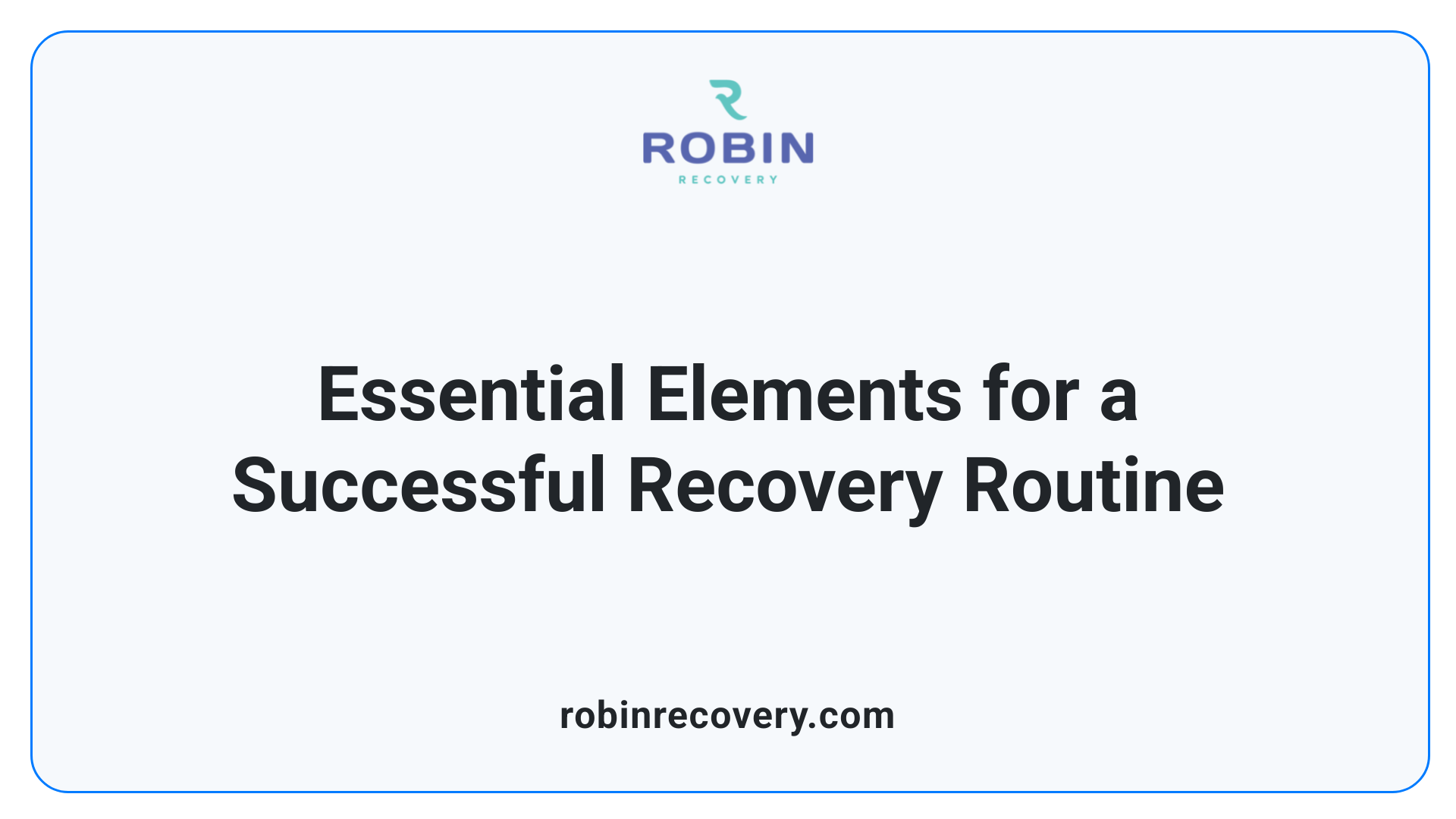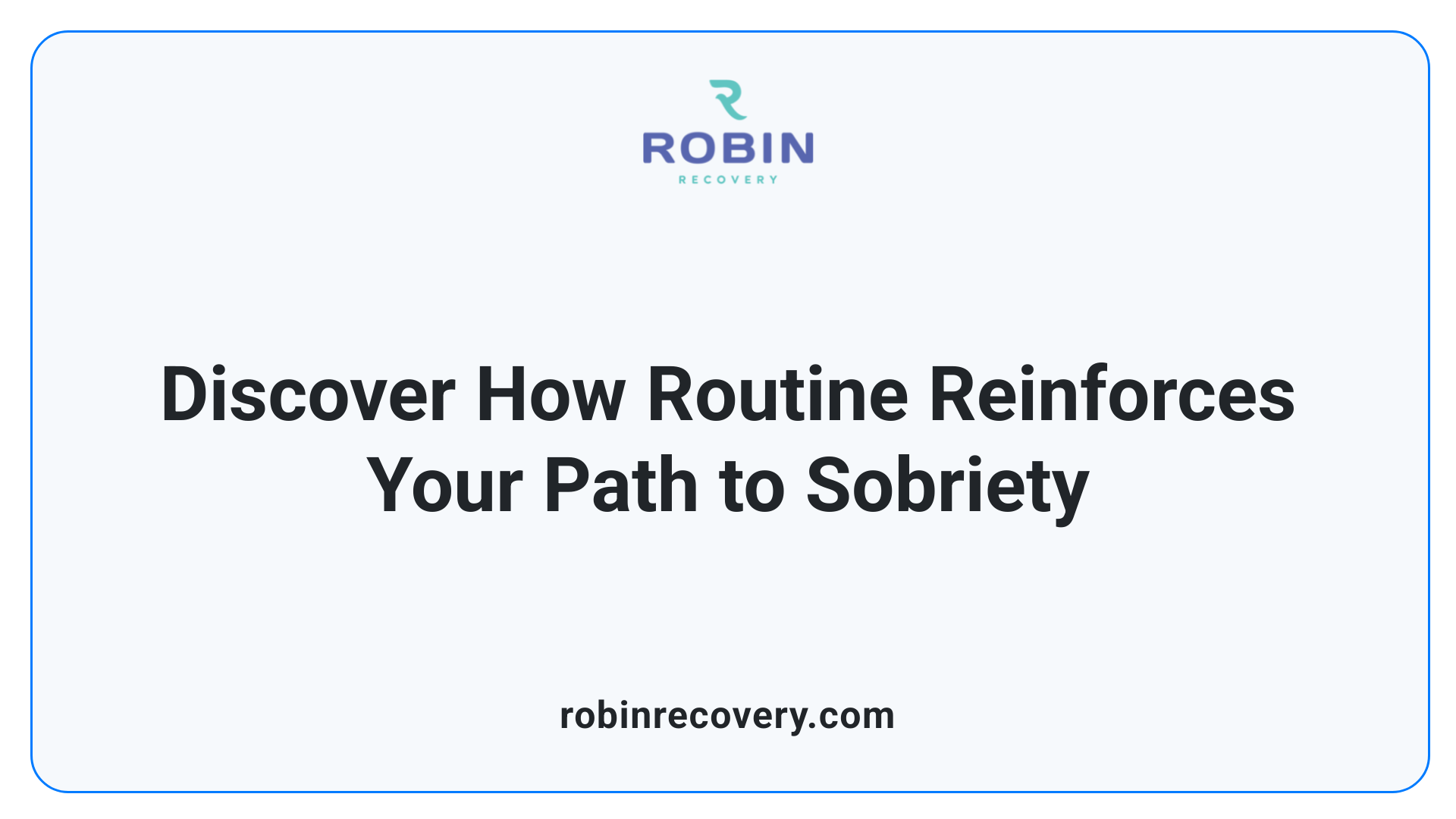How to Develop a Healthy Daily Routine in Sobriety

Introduction to Developing a Healthy Routine in Sobriety
Embarking on the journey to sobriety is a profound step toward reclaiming health, stability, and happiness. One of the most effective ways to support this transformation is by establishing a structured daily routine. This routine not only provides predictability and security but also fosters mental resilience, emotional stability, and physical well-being. In this article, we explore best practices for creating and sustaining a sober-friendly daily schedule, how to structure daily activities to enhance recovery, and the benefits of routine in maintaining long-term sobriety.
Creating a Personalized, Sober-Friendly Daily Schedule

What are best practices for creating and sustaining a sober-friendly daily schedule?
Developing a daily routine that supports sobriety is essential for maintaining long-term recovery. One of the first steps is establishing a consistent schedule that incorporates the fundamentals of self-care, healthy habits, and structured activities. Consistency in waking times, meal schedules, exercise, work or school commitments, and support group participation creates a sense of stability and predictability, which are vital during recovery.
Tailoring these routines to personal preferences enhances engagement and ensures sustainability. Including activities that bring joy, such as hobbies, creative pursuits, or social interactions, not only makes the routine enjoyable but also reduces the risk of boredom—often a relapse trigger. Healthy behaviors like balanced nutrition, regular physical activity, mindfulness practices, and adequate sleep are central to supporting both mental and physical health.
Identifying and avoiding triggers is crucial. This involves steering clear of toxic relationships, environments associated with substance use, and any other situations that may provoke cravings or stress. Developing coping strategies for internal stressors—such as anxiety or emotional distress—and external stressors like workload or social pressures can foster resilience. Techniques such as meditation, deep breathing exercises, or journaling can lower stress levels.
Ongoing reflection and participation in support networks like peer groups or therapy sessions reinforce commitment and provide accountability. Adjusting the daily schedule as needs evolve ensures that the routine remains relevant and effective. Being flexible, yet disciplined, allows for adaptation to life's unpredictability without compromising sobriety.
In summary, best practices include creating a well-balanced, personalized schedule that emphasizes regular routines, incorporates enjoyable and health-promoting activities, proactively manages triggers, and remains adaptable through continuous reflection and support. Such an approach cultivates a stable environment conducive to recovery, fostering confidence and resilience against setbacks.
The Role of Routine in Supporting Mental and Emotional Well-Being

How do routines support mental health and emotional stability in sobriety?
Establishing a regular daily routine is vital for maintaining mental clarity and emotional health during recovery from substance use. Routines create a predictable environment, which significantly reduces feelings of uncertainty and anxiety. When individuals follow consistent patterns—such as waking up at the same time each day, engaging in regular exercise, eating balanced meals, and attending support group meetings—they cultivate a sense of control and stability.
This structure forms a 'new normal' that reinforces positive habits and provides a foundation for emotional resilience. Such predictability helps users manage stress more effectively, as their minds and bodies become accustomed to routine activities that foster physical and mental well-being. For example, regular sleep schedules assist in regulating sleep patterns, which directly influence mood and cognitive function.
Structured activities also serve as healthy outlets for stress. Engaging in hobbies, mindfulness practices, meditation, or gratitude journaling within a routine gives individuals constructive ways to process emotions and find calmness amid recovery challenges. Moreover, consistent routines enable better self-discipline, which is crucial for resisting cravings and avoiding triggers.
Participating in group therapy, connecting with loved ones, and practicing self-reflection through daily routines foster feelings of connection and support, reducing isolation and bolstering confidence. These social and emotional engagements create a support network that encourages ongoing sobriety.
Furthermore, integrating mindfulness, meditation, and gratitude exercises into daily routines significantly enhances emotional regulation. These practices help individuals stay present, reduce stress, and develop a positive outlook, which all contribute to improved mood and self-esteem.
In conclusion, routines form a backbone for emotional balance in recovery, providing predictability, fostering healthy habits, and offering tools for managing stress. They help individuals establish a balanced, stable emotional state and create a resilient mindset essential for long-term sobriety and mental health.
Key Components of a Healthy Daily Routine in Recovery

What components should a healthy daily routine include for someone in recovery?
Establishing a daily routine is essential for sustaining sobriety and fostering mental and physical health during recovery. A well-rounded routine encompasses several vital elements that work together to create stability and promote well-being.
First, consistent sleep schedules are fundamental. Going to bed and waking up at the same times each day helps regulate the body's internal clock, known as circadian rhythms. This regularity improves sleep quality, reduces stress, and enhances mood, which are all crucial during recovery.
Balanced nutrition is another cornerstone. Consuming nutrient-rich foods like fruits, vegetables, nuts, and omega-3-rich fish such as salmon supports the body's repair processes and stabilizes blood sugar levels. Proper diet helps control cravings, lifts energy levels, and improves overall health.
Physical activity, including exercise or practices like yoga, boosts the release of happiness hormones such as dopamine and endorphins. Regular movement reduces stress, enhances sleep, and builds discipline, all of which are beneficial in resisting relapse triggers.
Personal hygiene routines play a significant role in feeling renewed and confident. Daily grooming, showering, and maintaining cleanliness not only promote physical health but also reinforce a sense of order and self-respect.
Participation in support groups or therapy sessions provides emotional backing and accountability. Regular engagement with a community facing similar challenges helps reduce feelings of isolation, reinforces commitment, and offers guidance during difficult times.
Engaging in meaningful hobbies and social activities adds purpose to daily life. Whether it’s art, sports, volunteering, or socializing with loved ones, these activities stimulate the mind, foster relationships, and serve as healthy distractions from cravings.
Stress management techniques like meditation, journaling, or deep breathing exercises are critical. They help manage emotional turbulence, reduce anxiety, and develop resilience against triggers.
In summary, a daily routine that combines healthy sleep, nutrition, physical activity, self-care, social support, and stress management forms the backbone of successful recovery. It provides stability, promotes self-control, and lays the foundation for a balanced, substance-free life.
The Benefits of a Structured Routine for Recovery Success

How does having a structured daily routine benefit those in recovery?
Implementing a daily routine is a cornerstone of successful recovery from substance use disorder. It offers a sense of stability and predictability during a time that can be filled with uncertainties and emotional upheaval. This predictability helps reduce feelings of fear and anxiety, making the transition to sober living more manageable.
A routine supports both mental and physical health by establishing consistent habits, such as waking up at the same time, eating balanced meals, engaging in regular exercise, and participating in therapy or support group meetings. These activities promote overall well-being, helping the body and mind heal from the impacts of addiction. Regular sleep patterns, for example, regulate the circadian rhythm and improve sleep quality, which is crucial for emotional stability.
Furthermore, routines effectively replace boredom and idle time, which are common triggers for relapse. Instead of resorting to old habits or environments associated with substance use, individuals can focus on constructive activities like hobbies, mindfulness practices, or volunteering.
Building a regular schedule also enhances self-control, self-esteem, and confidence. Achieving daily goals and sticking to routines fosters a sense of accomplishment, reinforcing the belief that recovery is achievable. Activities like maintaining personal hygiene, organizing living spaces, and engaging socially help rebuild self-worth.
Overall, a structured routine creates a supportive framework that not only helps individuals maintain sobriety but also strengthens resilience against potential setbacks. By fostering physical health, mental clarity, and emotional stability, routines become a foundation for sustained recovery and a healthier, more balanced life.
Strategies and Tips to Support Ongoing Sobriety
What strategies and practical tips can support sobriety and recovery?
Supporting sobriety involves applying a variety of effective strategies that reinforce a healthy, substance-free lifestyle. One fundamental approach is establishing a structured daily routine. This routine should incorporate regular habits such as balanced meals, consistent sleep schedules, physical activity, mindfulness practices, and self-care. These daily behaviors help manage cravings, improve mood, and reduce the risk of relapse.
In addition to routines, engaging in therapy and counseling provides essential mental health support. Techniques like cognitive-behavioral therapy (CBT), motivational interviewing, and the community reinforcement approach address underlying issues, strengthen motivation, and develop coping skills. Medications prescribed by healthcare providers—such as naltrexone, disulfiram, or methadone—are also beneficial in preventing relapse, especially for opioid and alcohol use disorders. Regular drug testing and breathalyzer checks contribute to accountability during recovery.
Building a strong support network plays a crucial role. Participating in peer support groups like Alcoholics Anonymous (AA) or Narcotics Anonymous (NA), along with recovery coaching, offers community, encouragement, and social accountability. These connections help individuals feel less isolated, share experiences, and stay committed to sobriety.
Recognizing personal triggers—such as stress, certain people, or environments—is vital. Developing personalized coping strategies, including relaxation techniques, distraction methods, and avoiding high-risk situations, helps manage these triggers effectively. Keeping a journal to document feelings and warning signs can also increase awareness and preparedness.
Engagement in rewarding activities like hobbies, volunteering, and new interests provides positive distractions that foster a sense of achievement and purpose. These activities enhance self-esteem and reduce boredom, which can be common relapse triggers.
Effective relapse prevention combines these elements into a comprehensive plan. It involves ongoing monitoring, support, and self-awareness. An interprofessional team—comprising healthcare providers, counselors, and community resources—collaborates to develop tailored relapse prevention strategies. Personalized plans may include medication management, behavioral therapy, lifestyle adjustments, and social support.
Overall, maintaining sobriety is a multifaceted process that benefits from consistent routines, strong community ties, professional guidance, and proactive management of triggers. Through these combined efforts, individuals can build a resilient foundation for long-term recovery and thrive beyond their addiction challenges.
The Importance of Flexibility and Adaptability in Routines
How can I structure my daily activities to enhance my recovery process?
Establishing a daily routine tailored to recovery involves blending consistency with flexibility. Start by setting predictable activities such as waking up at the same time each day, engaging in physical exercise like walking or yoga, maintaining balanced nutrition, and prioritizing sleep. These habits help stabilize your physical health and support emotional well-being.
Incorporate activities that foster connection, like attending support group meetings or checking in with a sponsor. Dedicate time for hobbies or recreational pursuits that bring joy and a sense of purpose. Practice mindfulness through meditation or journaling, particularly in the evening, to reduce stress.
However, it’s essential to remain adaptable. Life can be unpredictable, and rigid routines may lead to frustration or feelings of failure. Regularly review and tweak your schedule to accommodate unforeseen circumstances or changing needs. For example, if you’re feeling overwhelmed, consider adjusting your workload or adding more leisure time.
Avoid the trap of obsession with perfection, which can lead to boredom or burnout. Incorporate variety into your routines—try different physical activities, explore new hobbies, or vary your social engagements. This keeps your routine engaging and prevents feelings of monotony.
Using your routine proactively helps in handling stress and deterring relapse. When faced with challenging emotions or triggers, a flexible but structured schedule offers a sense of stability while allowing you to adapt your coping strategies as needed.
In sum, by creating a balanced, adaptable routine that addresses physical, emotional, and social needs, you reinforce your sobriety and build resilience. It’s about finding sustainable habits that can evolve with your recovery journey, turning routine adherence into a supportive tool rather than a strict obligation.
Final Thoughts on Building a Balanced, Supportive Routine
Developing and maintaining a healthy daily routine is a cornerstone of successful sobriety. It provides individuals with stability, purpose, and a robust framework to navigate challenges and celebrate progress. By integrating activities that nurture physical health, mental clarity, and emotional resilience—such as regular exercise, nutritious eating, mindfulness, and support group participation—recovery becomes more sustainable and fulfilling. Remember to approach routine-building with flexibility, patience, and self-compassion, continuously reassessing and adjusting as your journey evolves. A well-crafted routine is not only a tool for avoiding relapse but also a pathway to a healthier, more balanced life in sobriety.
References
- National Helpline for Mental Health, Drug, Alcohol Issues - SAMHSA
- The Importance of a Structured Daily Routine in Recovery
- Helpful Habits for a Sober Environment - Sobriety Solutions
- The Power of Ritual: 8 Tips to Create a Sober Morning Routine
- Develop a Healthy Daily Routine in Recovery
- Why Structure and Routine Are Important in Recovery
- 8 Simple Steps to Create a Healthy Daily Routine in Recovery
- Establishing a Daily Routine in Recovery - Tranquil Shores
- Developing & Maintaining a Healthy Daily Schedule in Recovery
